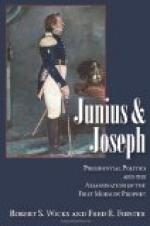The girl looked up to see the face of the schoolmistress flushed and shining with sudden tears.
“My dear,” said Susannah gently, “when I was your age flowers were given to me, but I did not love them half enough.”
The maiden tripped away, resolving at heart to heed the admonition, although she understood it very vaguely.
Susannah knelt down upon the floor behind the sill, pressing both hands upon her breast lest she should cry aloud.
“No! No! No!” she whispered, “I loved Ephraim, and it was because I left him that my heart closed up—because in insufferable pride and impatience I left him. Oh, my love, now I know that you loved me too.” She rocked herself in a passionate desire for Ephraim’s presence. The scene in the cold autumn wood at Fayette came back to her eyes and ears. She felt the very touch of his hand when he went. “Fool! fool!” she said, “foolish and wicked. If I Had not been proud, if I had not thought myself better than you and yours, I should have understood.” For some unexplained reason her mind reverted now to Halsey and the child, and she wept for them as she had never wept before.
After these tears she stood up and stretched out her arms as if embracing a new life. Alas! around her were only the ugly walls of the poor unfurnished room. Susannah, rousing herself from the warm scenes of quickened memory, felt the contrast.
The hope of Ephraim’s reply to her letter came to her smiling each morning, and, as the days passed, retired from her heart with a sigh each night.
When six weeks had gone and no reply came Susannah wrote again. This time she addressed the letter to the care of Mr. Horace Bushnell in Hartford, thinking that perhaps by some extraordinary chance Ephraim’s whereabouts might not be known in Manchester. This letter was, unlike all those that had preceded it, more brief, more reserved, and more gentle. It expressed interest only in his affairs, telling little of her own except the fact that she desired to return. Autumn came, and Susannah’s faith in man was tested to the utmost by the dreariness of daily disappointment.
If Ephraim were dead surely his mother or his friend would return her letters. If Ephraim were not dead what could be the explanation of this silence? Many vicissitudes of life occurred to her as possibly producing a change in him, and only one explanation of his silence was possible—that he was changed. That was a terrible belief to face. Her faith took the bit in its teeth and refused to be guided by intelligence. The whole strength of her volition abetted the revolt of faith. Anything, everything, might be true rather than that the essentials of character which went to make up Ephraim’s personality should be blurred or decomposed.
Susannah wrote again to Ephraim, to his mother and to Mr. Bushnell—three separate letters. She worked with the more zeal at her self-appointed task. So cheerful and energetic was she that she appeared to her pupils and acquaintance as a radiant being, and received the most genuine honour and affection from the Mormon settlement in Quincy.




